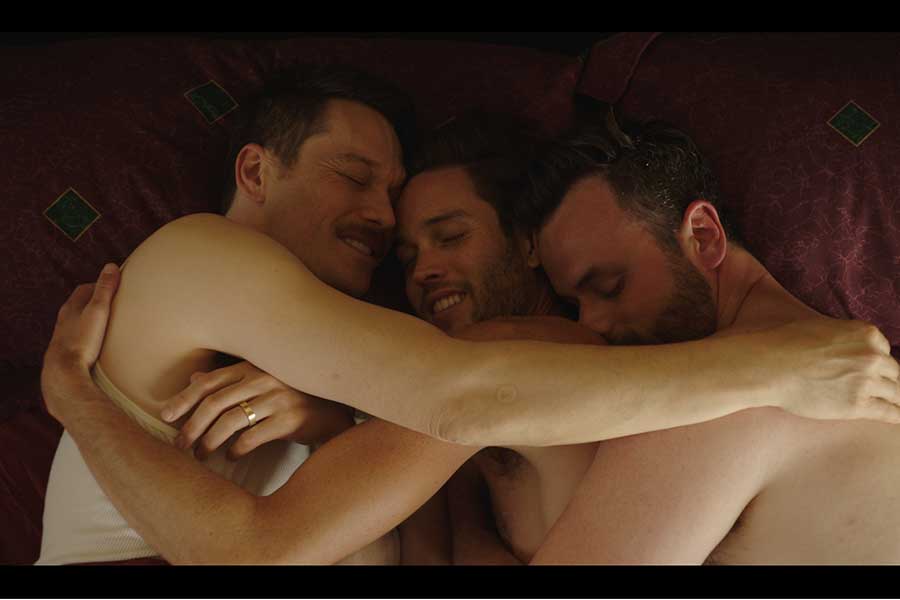Matthew Lynn is the out gay showrunner for the new series, “The Third,” now available on DVD and VOD. The six-part first season has the married couple Carl (Corey Page) and David (Ryland Shelton) bring Jason (Sean McBride) into their relationship. It’s not just a fling; these three men soon move in together. But as good as their sex is, problems develop, from jealousies to more significant insecurities about being part of a “triad” relationship.
Lynn spent three years developing “The Third,” which stemmed from his own experiences as a “third” who joined a couple. The writer, director, producer, cinematographer and sometimes actor used to be a Southern Baptist music minister. However, he said, that career path “didn’t work out” given the church’s attitudes toward gay people. Lynn started doing photography, and he watched movies — his parents owned a video store — before moving into directing and creating gay content.
In a recent phone interview, Lynn chatted with PGN about his experiences as a gay man in a three-way relationship and creating “The Third.”
Can you talk about how your life inspired “The Third”?
When I was 23, I came out to my family. I was living at home, and they said, “Leave. Don’t come back.” We’re good now, but, at the time, a gay couple took me in and showed me the ropes of what it means to be [gay], and we entered into a triad that lasted a couple of years. Around the time I started writing “The Third,” I got into another triad, and art imitates life imitates art. … Triads and open relationships don’t work for everyone, but sometimes they do. The show is about going against societal norms and doing what works for you.
How did you balance the dynamic between married couple Carl and David and the third, Jason?
I think a lot of it is borrowed from real life. It is based on my experience and from my perspective. The challenge was fleshing out the other two [married] characters’ perspectives — the jealousy in a marriage and all the emotions that come up when you watch someone you love and committed your life to falling in love with someone else.
There are discussions of how triads should operate, issues of approval and acceptance, as well as Jason’s roommate Katelyn (Fatimah Taliah) admitting that Jason has become a better person once in the triad. What are your thoughts about representing how triads operate, are accepted and how they benefit people?
Over time, especially with season two, it will be far more “pro”-triad. Season one is about the realities of being in one. People tend to be accepting of triads once they know people in them personally. They tend to be intrigued and ask questions like, “How does it work?” Society, as a whole, is not accepting. From my personal journey of being in a three-way relationship, it feels like a family. The dynamic is different, but there is a lot more love to go around. And cleaning the house is easier with three.
The show is suggestive, not explicit, when it comes to sex. Was that deliberate?
Yes. We wanted the show to be approachable to an audience that was not part of the gay world. We wanted people to understand a different way of life, and to do that, we can’t be explicit. That gives more credibility to the story. We don’t need sex to tell this story; we focus on interpersonal relationships between the characters.
Do you want viewers to side with David, Carl or Jason? How should we identify with these characters? They are complicated and not always likable.
I think every character in the show has things to like or not like about them. If there’s anything I’ve learned in relationships, it is that there are two sides — or three sides — to every story. I want viewers to be conflicted and work at liking them, because that’s how people are.
I admire that you are making a concerted effort to make queer films, series and shorts. Can you explain why?
We are losing our gay culture because you can be accepted anywhere. I absolutely want to be a queer filmmaker, and in the past six months, I have wanted to step out of my shell. Being a cinematographer, I felt I had something to say. So, I’ve taken on a bunch of directing opportunities. I have tons of queer stories inside of me that I want to tell – like “The Third” — so for that voice to come out and represent my stamp on history, I have to tell them.
